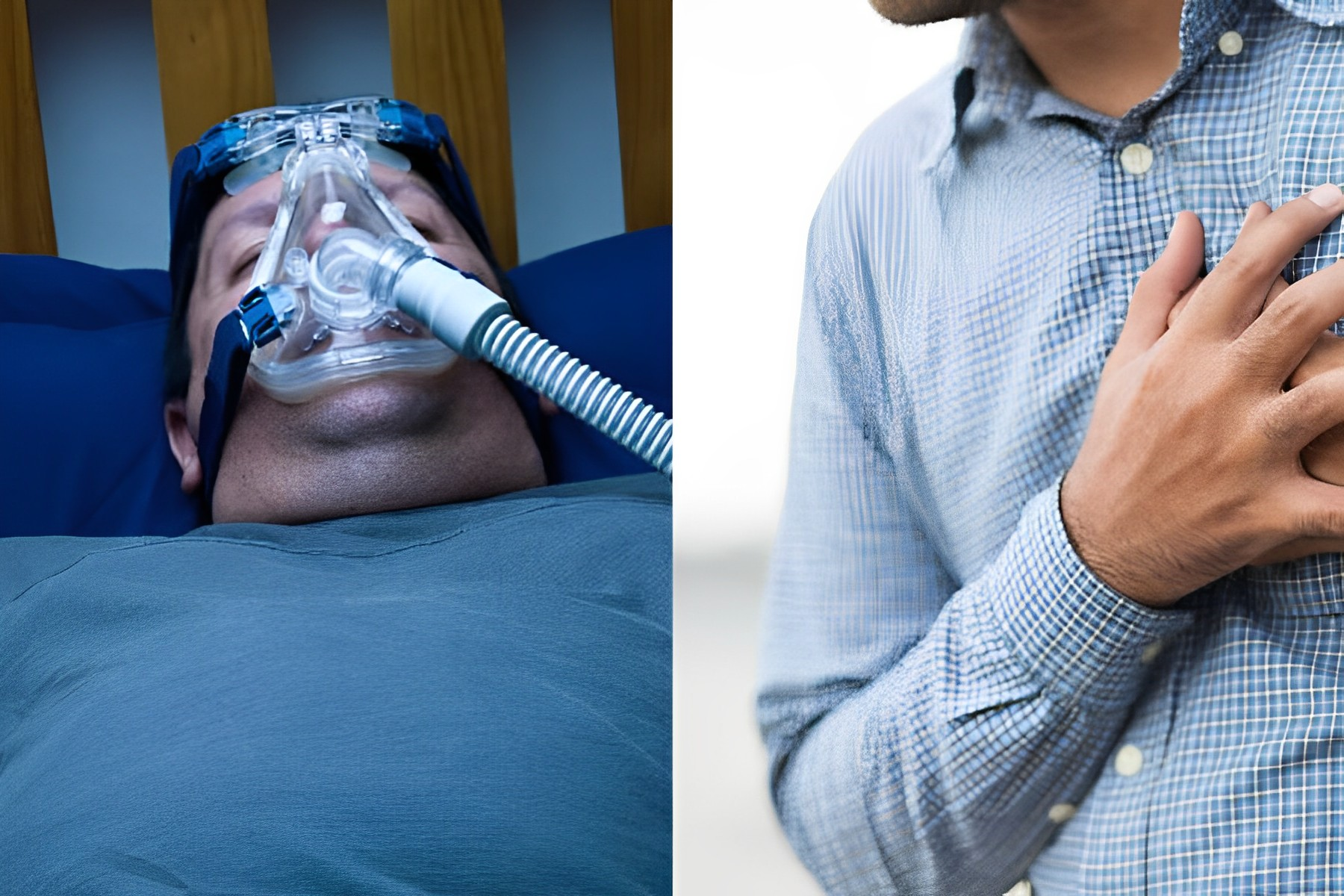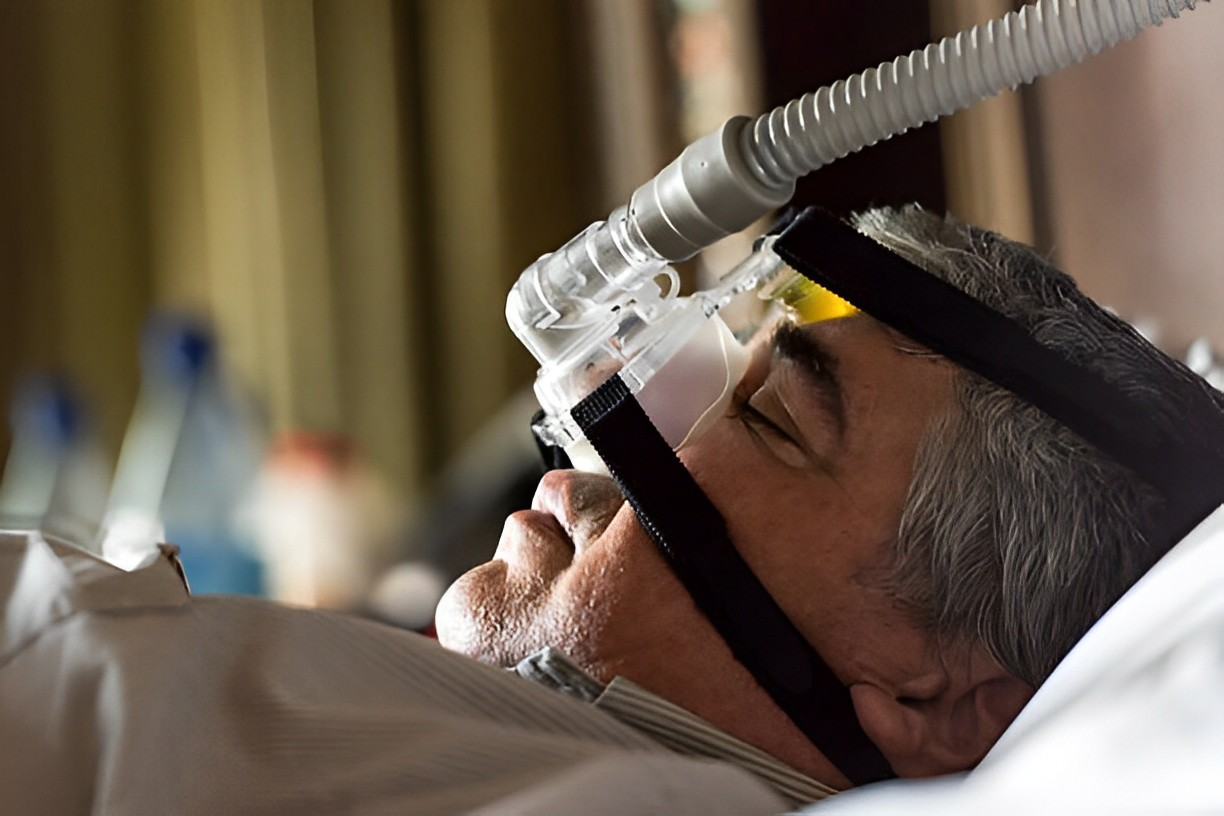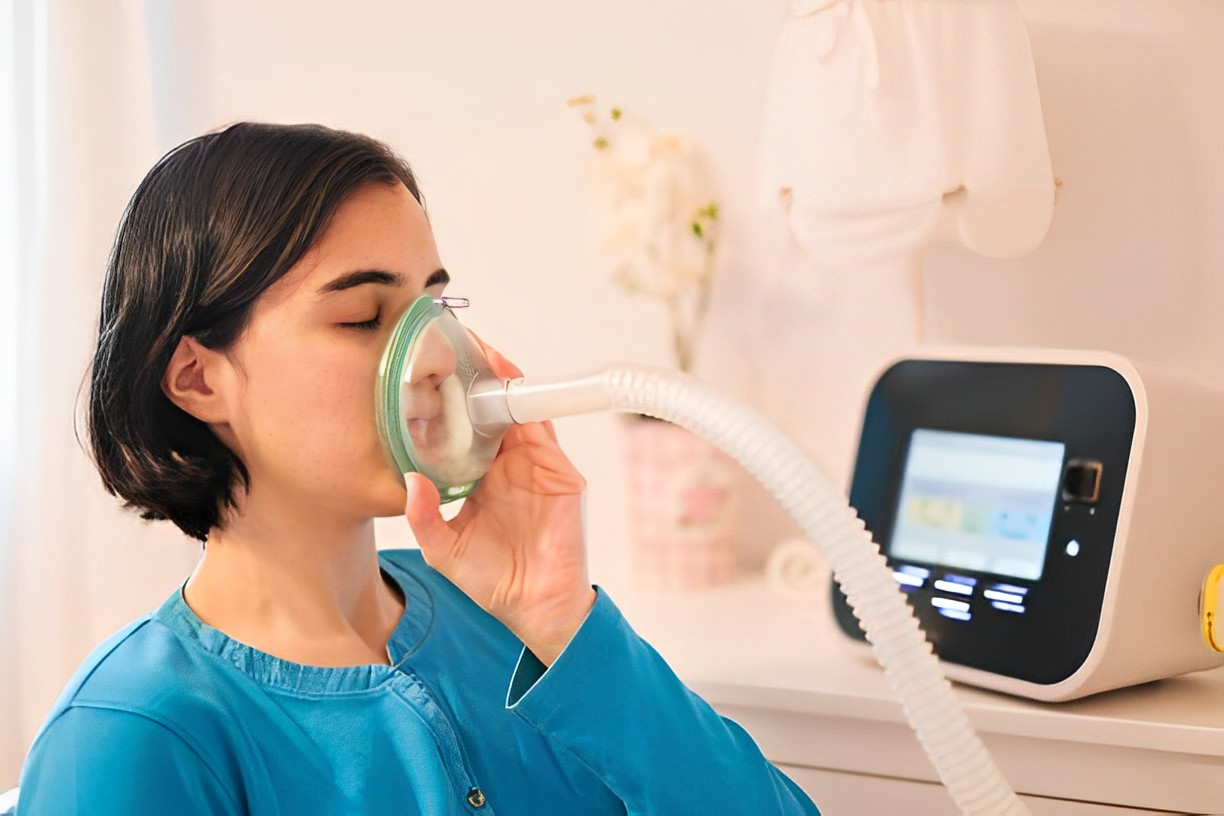Sleep apnea may be distressing for those suffering from it and for their spouses, who see their sleeping friends stop breathing, suffocate, and awaken hundreds of times every hour.
There is an relationship between sleep apnea and cardiovascular events such as heart attacks. It is linked to multiple major health issues, including diabetes, hypertension, and heart disease.
The concern is justified since sleep apnea is more than a nighttime inconvenience. According to studies, OSA raises the risk of cardiovascular disease, hypertension, and possibly cardiac arrest-related mortality.
We will examine how sleep apnea affects the heart and the preventative measures that may be taken. Therefore, whether you or someone you know suffers from sleep disorder, this article is sure to be informative. Let’s examine how sleep apnea might impact the heart in further detail.
Sleep Apnea and Cardiovascular Health: A Surprising Connection

Over the last two decades, preliminary research has connected sleep apnea and cardiovascular disease. Said Mostafavi, M.D., the Chief Medical Officer at Advanced Sleep Medicine Services, Inc., and a sleep specialist, says that experts are still trying to determine precisely how sleep apnea may weaken the heart, cause hypertension, and raise cardiac risk, but the evidence is solid. Said Mostafavi, informing his coworkers about the link at every chance.
“Patients with obstructive sleep apnea may be in danger,” – Said Mostafavi.
He emphasizes that if symptoms indicate sleep apnea, a person confronts more than just poor sleep quality. There may be cardiovascular and cerebrovascular problems that risk life.
“I believe the cardiovascular risk is highly prevalent and significant, as well as diagnosable and curable.” – Said Mostafavi
Heart Effects Of Sleep Apnea: The Basics

Sleep apnea may take two different forms. Central sleep apnea, the rarer variety, occurs when the brain’s impulses that control breathing during sleep are disrupted. The most prevalent kind is sleep apnea, in which soft tissues impede the airway during sleep.
The first indication of a link between heart health and sleep apnea is the frequency with which cardiovascular illness and sleep disruption occur in the same people.
One study found 50% or more cardiovascular patients had sleep-disordered breathing, compared to 5% of the normal population. Another research found that individuals with both heart failure and sleep apnea had a mortality risk double that of those with heart failure alone. Despite its rarity in the general population, central sleep apnea is common among heart failure patients.
Is sleep apnea linked to cardiac death?

Sleep apnea patients are also more susceptible to sudden cardiac death during their sleeping hours, while persons without sleep apnea are least vulnerable to sudden cardiac death.
Participants with sleep-disordered breathing, including loud snoring and sleep apnea, were 3 times more likely to die within 18 years, according to a study of 1,522 persons recruited for the Wisconsin Sleep Study.
Stroke and cardiovascular issues were the significant causes of mortality in this group. Upon closer inspection, however, sleep apnea and cardiovascular disease relationship became evident: those with untreated severe sleep apnea episodes were five times more likely to pass away from cardiovascular-related causes.
Another research stands out because of its large sample size. Sleep disorders research examined the medical records of 10,701 persons who underwent sleep investigations at the Sleep Disorder Center of the Mayo Clinic in Minnesota.
They discovered that the risk of sudden cardiac death was considerably increased in those who were given continuous positive airway pressure (CPAP) treatment but did not utilize the device between 5 and 15 years following the sleep evaluation.
The researchers concluded that the risk of sudden cardiac death increased if sleep apnea lowered the blood oxygen content to as low as 78 percent on average throughout the night. Notably, the researchers also discovered that sleep apnea severity increased the chance of abrupt cardiac death.
How Does Apnea Affect The Heart?

Researchers are still working to completely grasp how sleep apnea could affect heart health. Sleep disturbance is also closely linked to type II diabetes, obesity, and stroke—all medical conditions that may contribute to the emergence and aggravation of cardiovascular issues.
However, the evidence is mounting. Stress, metabolic syndrome, and sleep apnea remain independent risk factors for cardiovascular disease, even if you take the other risk variables out of the equation.
According to a joint scientific declaration from the (AHA) American Heart Association and the American College of Cardiology, obstructive sleep apnea increases cardiovascular disease and mortality even when these other diseases are included.
A person’s blood pressure, heart rate, and breathing rise and fall as they enter and exit various sleep phases during a routine, disorder-free night’s sleep. However, with sleep apnea, these alterations are more pronounced and linked to the length of apnea episodes than regular sleep patterns. Numerous changes occur throughout the body due to this interference with the sleep cycle.
Blood oxygen levels in those with sleep apnea may fall to around 60%. These percentages often range from 95 to 100 percent. Numerous alterations are triggered by this hypoxemia. Blood pressure spikes that might exceed 240/130 are caused by blood vessels constricting and rising blood pressure.
Additionally, sleep apnea causes the sympathetic nervous system to become more active. People who suffer from sleep apnea have faster heart rates even while awake. They have less heart rate variability and more significant high blood pressure variability, both of which have been linked in the Framingham Heart Study to worse heart health.
How Women May Be at Greater Risk for Heart Disease

Sleep apnea stresses may promote system-wide inflammation and insulin resistance. In a recent study, Brigham and Women’s Hospital senior physician Susan Redline, M.D., and Harvard Medical School Professor of Sleep Medicine Peter C. Farrell found that women with sleep apnea have greater Troponin T levels.
This protein gets into the bloodstream when the heart muscle is hurt. Susan Redline’s research discovered that older women had a greater chance of acquiring heart disease linked to sleep apnea than older men. Although males are more likely to have sleep apnea in the first place.
She also cautions that women with sleep apnea may not snore or be as sleepy throughout the day as males, citing problems with sleep quality and exhaustion.
The joint statement acknowledges that there is still much to learn about biology at work. Sleep apnea has serious effects, therefore doctors should diagnose it in men and women.
Types Of Cardiovascular Disorders With OSA

Untreated sleep apnea may result in several cardiovascular diseases. Sleep apnea makes hypertension more likely or harder to manage.
Approximately 30% of persons with hypertension have sleep apnea. There is a 50 percent likelihood that those with sleep apnea also have hypertension. OSA may cause heart rhythm problems, including atrial fibrillation (a kind of irregular heartbeat) and bradycardia (slow heart rate).
Individuals with severe obstructive sleep apnea are four times as likely as those without OSA to suffer atrial fibrillation. If you do not get therapy for sleep apnea, your atrial fibrillation may be challenging to manage. Those with untreated obstructive sleep apnea who have had atrial fibrillation treated with catheter ablation (a particular operation performed on the heart) are 25% more likely to have their atrial fibrillation recur.
Individuals with sleep apnea are also at increased risk for coronary artery disease. Coronary artery disease, commonly known as atherosclerosis, occurs when the tiny blood channels that provide blood and oxygen to the heart become constricted. Coronary artery constriction may result in heart attacks and cardiac damage.
In the future, persons with severe untreated OSA are twice as likely as those without OSA to have a heart attack. In addition, data indicate that up to 70% of those hospitalized for coronary heart disease were also diagnosed with obstructive sleep apnea.
Additionally, OSA might exacerbate heart failure. Further, untreated OSA may lead to heart failure. Also, if you have heart failure, your chances of having OSA are pretty high.
Bradycardia During Sleep Apnea

A slow heartbeat is a bradycardia. Adults’ hearts typically beat between 60 and 100 times per minute when resting. Your heart beats less often than 60 times each minute if you have bradycardia.
Ninety-five percent of all types of apnea such as central, obstructive, and mixed) were linked to bradycardia. The bradycardia became more noticeable with more prolonged apneas and more significant oxygen and hemoglobin desaturation. Heart rate decreased from 11.4 to 9.5 beats per minute (bpm) during apneas lasting 20 to 39 seconds.
Breathalyzers exhibited no influence on heart rate that could not be accounted for by the apnea stage or degree of desaturation. Similar results were seen when SA participants who were awake held their breath. It is concluded that bradycardia is a recurrent sleep apnea syndrome brought on by the interaction of hypoxemia and breathing stoppage.
CPAP Therapy Can Prevent Heart Damage Caused By Sleep Apnea

There is a way to avoid sleep apnea-related cardiac damage. Earlier treating sleep apnea may prevent this cascade and arrest the insults that lead to heart failure and death.
Following the initiation of (CPAP) continuous positive airway pressure treatment, an Irish study team monitored 168 patients for many years.
14 percent of those who did not use CPAP had new instances of heart disease, compared to 5 percent of those who did use it. The fact that the medication saves lives supports the researchers’ conviction that there is a relationship between sleep apnea and heart issues.
Another research group, this time in Spain, followed up on an earlier sleep study to see if CPAP affected the survival of participants.
Over a decade, 264 healthy males, 377 male snorers, 403 men with untreated mild-to-moderate obstructive sleep apnea, 235 men with untreated sleep apnea, and 372 men with sleep apnea who utilized CPAP were evaluated annually.
The individuals with untreated severe sleep apnea had the lowest prognosis after 12 years. More than a third had undergone a nonfatal cardiovascular event, such as a heart attack, and around 17 percent had experienced a fatal cardiovascular event. In contrast, men who used CPAP had these occurrences at about the same rate as healthy men.
Researchers hypothesize that the reduction of sleep-related respiratory disturbances afforded by CPAP enables the body to heal previous harm. Experts expect CPAP treatment’s benefits to take years to show because blood vessel walls and metabolism change over time.
Obviously, therapy for sleep apnea alone is not sufficient protection against cardiovascular disease. Diet and exercise are still essential for maintaining a healthy heart.
The Alarming Prevalence of Undiagnosed Sleep Apnea in the US
About one in five U.S. individuals have mild sleep apnea, while one in fifteen has moderate or severe cases. Over 85 percent of patients with sleep apnea have not been identified, according to experts. This implies that thousands of individuals are ignorant of the danger their misdiagnosed disease poses to their hearts.
In 2015, around 326,200 Americans died from sudden cardiac death. The thousands of undiagnosed sleep apnea sufferers and indications that the disease may cause such deaths raise concerns.
Talk With Your Medical Team

It is essential to prepare for appointments so that all of your questions may be addressed.
Keep a record of your sleeping patterns and your mood. Be ready to talk about other health issues and problems in your life. Prepare a list of questions in advance.
Some good questions may include the following:
- Should I do a sleep study? How should I prepare?
- Which sleep expert would you recommend?
- What do the findings reveal?
- What effect does my sleep have on my heart?
- What remedies do you suggest?
- Could my weight be a factor in my OSA? If so, how can I lose weight safely?
- Do I need CPAP treatment for my excessive daytime sleepiness?
- Can I bring my CPAP machine with me?
- How can I make CPAP use more comfortable?
- Will my sleep apnea therapy be temporary or permanent?
- What actions can I take to improve my quality of sleep?
- How about reducing stress?
Sleep apnea is a significant medical disorder that may lead to severe health problems if left untreated. As untreated sleep apnea may lead to heart problems, you must speak with your medical team to verify that your condition is being handled effectively.
The medical team may provide treatment choices, such as lifestyle modifications and other services, to help you manage your sleep apnea and lower your risk of heart disease. It is crucial for your general health and well-being that you take the time to discuss your sleep apnea with your medical team.



